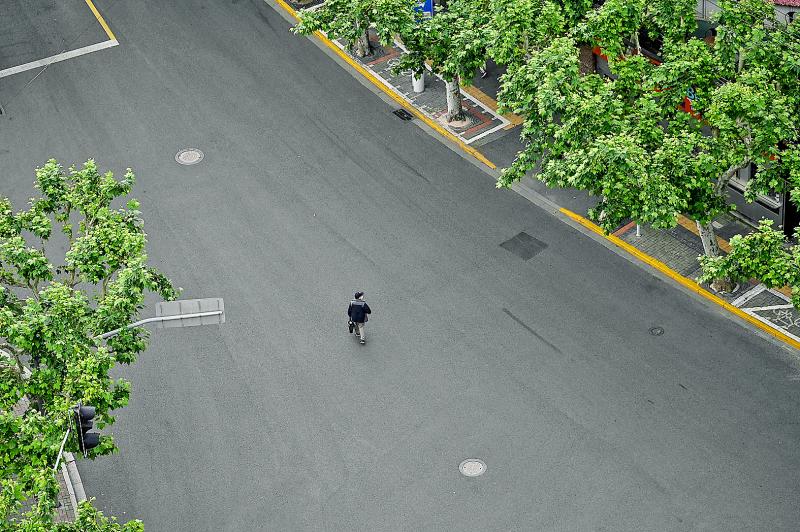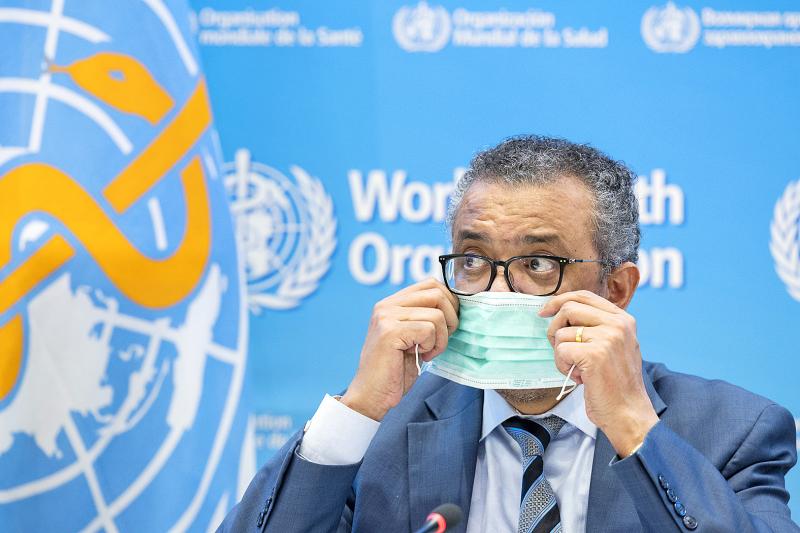China’s censors yesterday scrambled to wipe online debate over its “COVID-19 zero” strategy after the WHO criticized the country’s pandemic policies.
China’s COVID-19 policies have trapped most of Shanghai’s 25 million people in a lockdown with no clear end date, while Beijing has also gradually corralled many of its residents indoors as it battles its biggest outbreak since the pandemic began in 2020.
On Tuesday, WHO Director-General Tedros Adhanom Ghebreyesus urged China to change tack, saying that its approach “will not be sustainable” in the face of new fast-spreading variants.

Photo: AFP
The intervention prompted China’s army of Internet censors to snuff out his comments.
Searches for the hashtags “Tedros” and “WHO” on Chinese social media displayed no results, while users of the WeChat app were unable to share an article posted on an official UN account.
A social media hashtag about the WHO’s comments, which had been a rallying point for lively online discussion, appeared to have been blocked by mid-morning.

Photo: AP
Before they were expunged from the Chinese Internet, comments had questioned Beijing’s policies, with one saying: “Even the WHO’s Tedros has now changed his stance.”
Another wrote: “Will our government listen to the WHO director-general’s recommendations?”
Virus controls are causing anger and frustration, especially in Shanghai.
The city has witnessed repeated protests and violent scuffles with police, images that have pinballed across social media before censors can catch up.
The Chinese Communist Party says its virus strategy places life before material concerns and has averted public health crises.
Chinese Ministry of Foreign Affairs spokesman Zhao Lijian (趙立堅) brushed off questions about the WHO’s comments, saying that Beijing’s policy “can stand the test of history” and was “scientific and effective.”
“We hope that relevant individuals can take an objective and rational view of China’s epidemic prevention and control policies ... and refrain from making irresponsible remarks,” Zhao told a regular news conference.
Discussing Beijing’s strategy on Tuesday, Tedros said that WHO experts “don’t think that it’s sustainable, considering the behavior of the virus now and what we anticipate in the future.”
Hu Xijin (胡錫進), a former editor of China’s Global Times, slammed the comments in a message online, saying: “In the end, the WHO’s attitude isn’t important.”

ROLLER-COASTER RIDE: More than five earthquakes ranging from magnitude 4.4 to 5.5 on the Richter scale shook eastern Taiwan in rapid succession yesterday afternoon Back-to-back weather fronts are forecast to hit Taiwan this week, resulting in rain across the nation in the coming days, the Central Weather Administration said yesterday, as it also warned residents in mountainous regions to be wary of landslides and rockfalls. As the first front approached, sporadic rainfall began in central and northern parts of Taiwan yesterday, the agency said, adding that rain is forecast to intensify in those regions today, while brief showers would also affect other parts of the nation. A second weather system is forecast to arrive on Thursday, bringing additional rain to the whole nation until Sunday, it

LANDSLIDES POSSIBLE: The agency advised the public to avoid visiting mountainous regions due to more expected aftershocks and rainfall from a series of weather fronts A series of earthquakes over the past few days were likely aftershocks of the April 3 earthquake in Hualien County, with further aftershocks to be expected for up to a year, the Central Weather Administration (CWA) said yesterday. Based on the nation’s experience after the quake on Sept. 21, 1999, more aftershocks are possible over the next six months to a year, the agency said. A total of 103 earthquakes of magnitude 4 on the local magnitude scale or higher hit Hualien County from 5:08pm on Monday to 10:27am yesterday, with 27 of them exceeding magnitude 5. They included two, of magnitude

CONDITIONAL: The PRC imposes secret requirements that the funding it provides cannot be spent in states with diplomatic relations with Taiwan, Emma Reilly said China has been bribing UN officials to obtain “special benefits” and to block funding from countries that have diplomatic ties with Taiwan, a former UN employee told the British House of Commons on Tuesday. At a House of Commons Foreign Affairs Committee hearing into “international relations within the multilateral system,” former Office of the UN High Commissioner for Human Rights (OHCHR) employee Emma Reilly said in a written statement that “Beijing paid bribes to the two successive Presidents of the [UN] General Assembly” during the two-year negotiation of the Sustainable Development Goals. Another way China exercises influence within the UN Secretariat is

Taiwan’s first drag queen to compete on the internationally acclaimed RuPaul’s Drag Race, Nymphia Wind (妮妃雅), was on Friday crowned the “Next Drag Superstar.” Dressed in a sparkling banana dress, Nymphia Wind swept onto the stage for the final, and stole the show. “Taiwan this is for you,” she said right after show host RuPaul announced her as the winner. “To those who feel like they don’t belong, just remember to live fearlessly and to live their truth,” she said on stage. One of the frontrunners for the past 15 episodes, the 28-year-old breezed through to the final after weeks of showcasing her unique